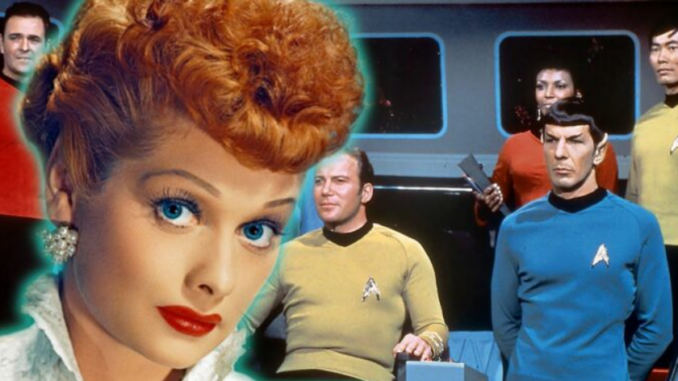
Lucille Ball’s “I Love Lucy” wasn’t just a hilarious television show that dominated the airwaves in the 1950s. It was a pop culture phenomenon that, behind the scenes, played a pivotal role in launching another iconic series: Star Trek.
This article explores the surprising connection between “I Love Lucy” and Star Trek, along with Lucille Ball’s influence on the television landscape.
From Sitcom Queen to Production Powerhouse
“I Love Lucy,” which aired from 1951 to 1957, was more than just a show for Ball. Alongside her then-husband Desi Arnaz, she co-founded Desilu Productions, the company that produced the sitcom. Desilu wasn’t just a production company; it was Ball’s creative playground. She wasn’t a figurehead; she was deeply involved in the company’s direction.
Desilu’s success stemmed from Ball’s foresight and her ability to identify promising projects. The company produced numerous shows that became cultural touchstones, including “The Andy Griffith Show” and “The Untouchables.” However, it’s Star Trek that stands out as a series Ball deserves significant credit for.
Saving Star Trek: A Second Shot for a Sci-Fi Visionary
Gene Roddenberry’s vision for Star Trek was ambitious, but the high cost of producing a pilot raised concerns at Desilu’s board. While the details are debated, legend has it that Ball, despite not fully grasping the concept (believing it was about traveling entertainers!), championed the project.
The original pilot, “The Cage,” wasn’t well-received by NBC, largely due to its cerebral nature. Thankfully, NBC gave the green light for a second pilot, with a new captain (James T. Kirk replacing Christopher Pike) and a revised approach. Crucially, Ball greenlit the reshoot, giving Star Trek another chance.
Beyond Funding: Ball’s Belief in a Sci-Fi Future
Ball’s influence went beyond just funding. Some accounts suggest she personally advocated for the second pilot with NBC executives, convinced of Roddenberry’s vision. Whether she shaped the series creatively is debatable, but her belief in its potential was instrumental in bringing Star Trek to life.
“I Love Lucy” Leaves its Mark on Star Trek
The connection between “I Love Lucy” and Star Trek extends beyond their shared production company. Ball’s later sitcom, “Here’s Lucy,” featured a repurposed costume from the original Star Trek pilot. The Mugato, a half-gorilla, half-baboon creature from “The Cage,” became the garboona in a “Lucy’s Safari” episode.
Mission: Impossible: Another Show Saved by Ball’s Vision
Star Trek wasn’t the only show Ball championed in 1966. Another Desilu production, “Mission: Impossible,” faced early cancellation concerns due to production strain. Similar to Star Trek, Ball’s belief in the show’s potential ensured its survival. Interestingly, Leonard Nimoy, who played Spock in Star Trek, later joined the cast of Mission: Impossible, further blurring the lines between the two franchises.
A Legacy of Foresight: The Enduring Success of Two Franchises
Years later, J.J. Abrams directed two Star Trek films and Mission: Impossible III, solidifying the connection between these Desilu-born franchises. The success of Star Trek: The Next Generation in the late 1980s even led to a (less successful) Mission: Impossible reboot.
However, the story doesn’t end there. Under Tom Cruise’s leadership, Mission: Impossible has become a global box office behemoth. The continued popularity of both Star Trek and Mission: Impossible in the 2020s is a testament to Lucille Ball’s incredible foresight in backing these fledgling shows back in the 1960s.
I Love Lucy’s Enduring Legacy
“I Love Lucy” wasn’t just a funny show; it was a cultural force. It shattered viewership records, broke ground for female comedians, and pioneered the use of multi-camera setups in sitcoms. More importantly, for sci-fi fans, it played a crucial role in launching Star Trek, a franchise that continues to inspire audiences today.
So, the next time you watch a rerun of “I Love Lucy” or beam aboard the Starship Enterprise, remember the remarkable woman behind the scenes – Lucille Ball, the comedienne who not only made us laugh but also helped bring a galaxy far, far away to our living rooms.

